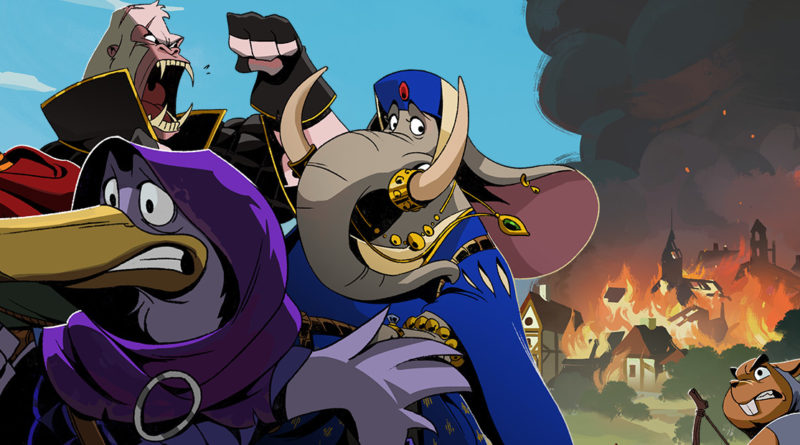Foretales Review (PC) – Back To The Start, Again
A choose-your-own adventure game with unique card-based gameplay, Foretales ends up too reptitive for its own good. The Finger Guns Review:
Thanks to the wonders of modern technology, we no longer have to rely on having other people around to enjoy a good card-based game or adventure tabletop experience. No more exhausting your social battery or having to go to a distant location to meet like-minded people. Now, the games are brought to us in the luxury of our isolated homes.
My experience with card-based games is limited to copious amounts of hours in both Gwent (both Witcher 3 and standalone title) and Thronebreaker. Aside from the occasional dabble in the genre, I’m a relative rookie when it comes to partaking in this niche area of gaming. Foretales, thankfully, is a welcoming adventure that looks akin to rocket science but can be picked up like secondary school chemistry (Bunson burners and all).
Unlike other card-based games, the entirety of its gameplay and story is told through the use of cards, rather than just combat. It’s like having a warm winter’s evening in over a D&D board with friends, only it’s summer, and I have no friends. Anyway. Can this unique concept hold up for repeated runs or is it just a poorly executed board game in digital form?
Elephant In The Room
Foretales is fundamentally a story-driven game involving numerous branching paths. You’re immediately thrown into this anthropomorphic universe where your decisions of which missions to take on, and in which order, will ultimately decide your next available paths and eventual ending. Right off the bat, you can see a litany of potential routes, stories and conclusions available, meaning there’s a lot of replay value on offer.
The story itself has a few layers, much like an onion. Your primary character, Volepain, interacts with an object that allows him to see snippets of future events coming to pass. As you may guess, these are all of the catastrophic variety. Should you choose to save a companion before imprisonment or prioritise saving a town that’s inevitably going to be set ablaze?
You won’t have time to do everything, quite the opposite. Every mission you undertake will move the world forward a turn, meaning if you detour or choose one mission over another, you risk a different calamity occurring. It’s creates a sense of pressure for every decision you make, while again encouraging you to hop back in after a campaign to see the outcomes and opportunities of routes you never took, or horrendous events you never managed to prevent.
There’s lots of ground covered, from a plague that’s spreading corruption and turning people into ethereal creatures, to political posturing and finding ancient relics belonging to cults. It’s all handled pretty proficiently but it can blend together and the break-neck pace you have to move on means you never really settle into enjoying the story as much as I probably would have wanted.
Narrative is provided predominantly through text dialogue and witty comments from the narrator who adds some levity throughout, though a couple of his lines started to repeat a little too often and became slightly annoying. The story serves well enough for the basis of the game, but it’s not phenomenal to blow you away.
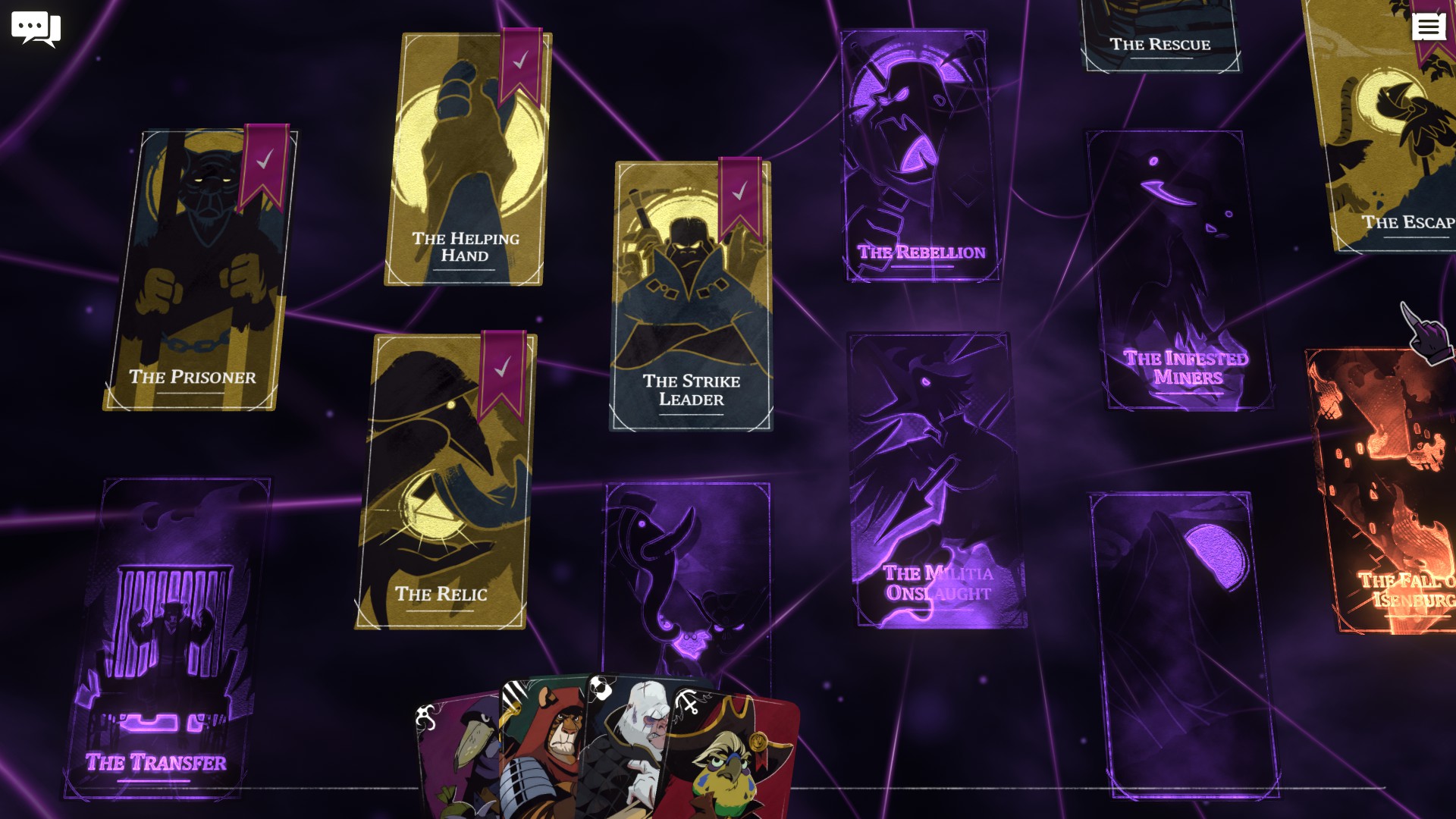
Play Your Hand
Once you’ve selected one of your available routes or missions, you’ll need to engage with the card mechanics proper. Each mission is made up of multiple regions – complete all regions and you’ll finish the level, easy enough. To progress through a region, there’ll be both an exploration deck and enemy deck, which are doled out as you play. On the board, there’ll be a number of locations drawn from the exploration deck which you interact with using your character’s abilities cards, and item cards.
Still with me? I promise, it sounds more complex than it is in reality. Say for example your objective is to get past a guard checkpoint. You may be able to bribe them with money, so you use a rallying call card on a tavern to find a trader. You can sell your food to said trader for money, then bribe the guard. Alternatively, you could use different abilities to seek out different people or areas, allowing you to find a false pass or do good deeds to build up fame to impress said guard.
Most region objectives will have different ways to progress, though some are more linear/pre-defined. Each character in your party has their own deck, with up to 6 evenly spread between them in your hand at any time. You have options to swap out cards from hand-deck but discarding your hand card, while you can rest a limited number of times to draw 3 cards per character (sometimes having to sacrifice food or money to do so).
Should your number of rests run out or a character’s health reach 0, you lose and restart from that region again. As you clear locations, they’ll be discarded and a new place drawn from the exploration deck, which then recycles. If you find yourself committing bad deeds or if there’s enemies in pursuit via their deck, when a new location is drawn it may run the risk of adding a group of foes to handle, before you can interact with that location.
Like I said, it sounds freaking ridiculous to read about, but it becomes very intuitive very quickly. The UI does a great job of telling you what cards do or don’t do with other cards, and there’s a very helpful hint system if you find yourself stuck. It works surprisingly well but by the end of my first campaign it did become stale and quite tiresome to constantly be maneuvering between locations or wasting cards to get the location I needed, but as a concept it’s pretty unique.
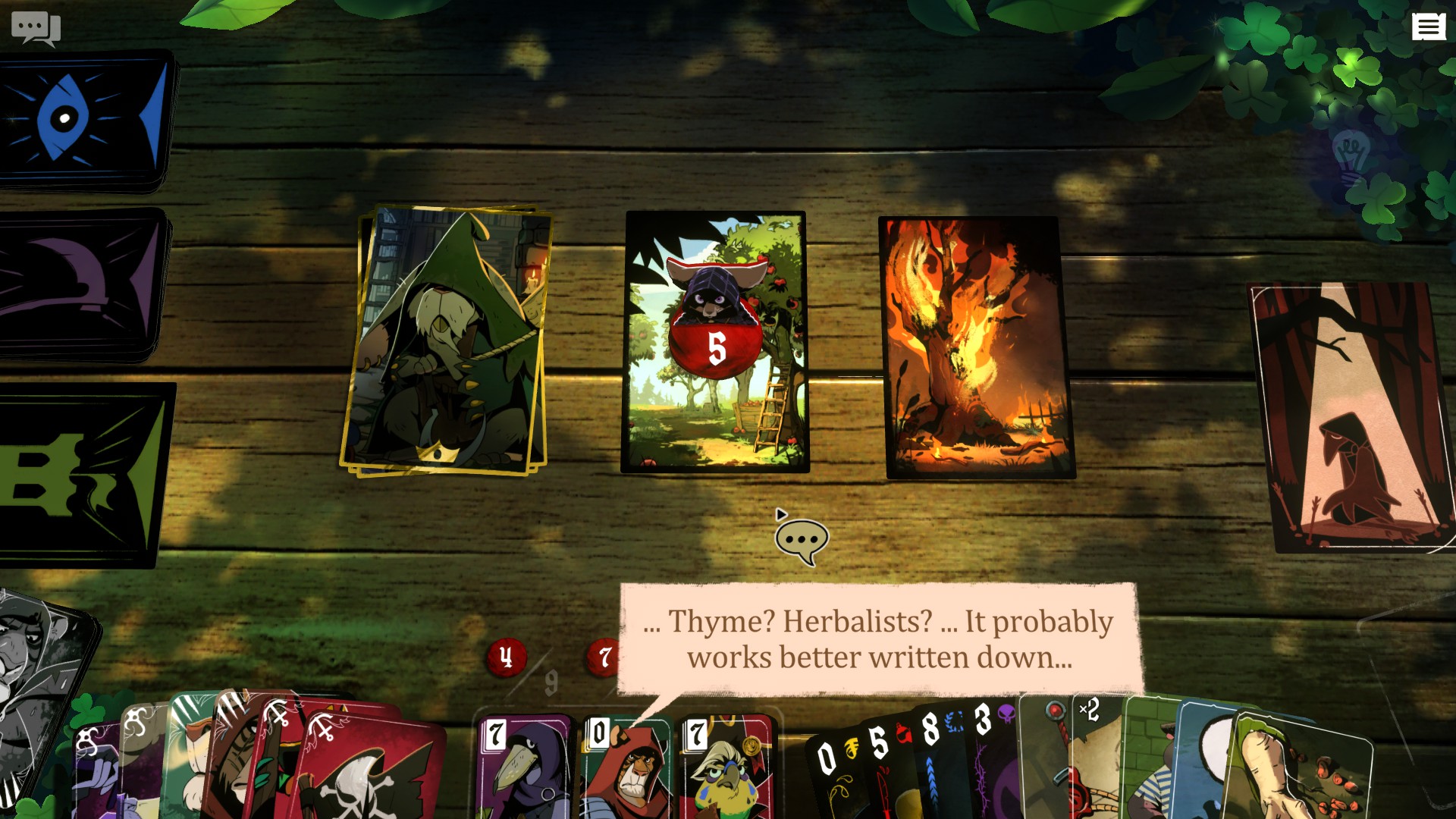
Hit or Stick?
Character cards aren’t just used for exploration purposes however, as every card has a use in combat encounters as well. Should every location be contested by an enemy force or a specific place you need to interact with is guarded, you’re gonna have to clear the way. How you go about strategizing this, well, that’s up to you and how creative you want to be.
An overwhelming force may look intimidating, but there are means to overcome them either non-lethally or more efficiently. Prior to any combat beginning, you can use a variety of non-violent cards to even the odds. For example, a bandit faction could be sent packing by spending Fame or Grim points to impress or intimidate them out of the battle. Guards can be bought off with gold and creatures can be satisfied with food.
Enemy battalions have a morale counter, with each foe holding points that contribute to this. Get off the most intimidating enemy and you might reduce the morale to 0, meaning all 3 of the other troops flee the battle, for instance. Once you engage, it’s about using your ability cards to take out the other side before they inflict to much damage unto your party. Buffing, debuffing, special abilities and using items or recruited single-use figures can all turn the tide.
It’s your job to work out the best course of action, and usually, that’s not going all-out warfare on a frog just because he’s a greedy son-of-a-toad. Combat, and the decisions you make around it, were the best part of Foretales for me and had me hooked in planning out my optimal success while also being constrained with either not enough resources or having poorly planned beforehand.
Foretales can be punishing if you over-exert or don’t take the time to manage your party (e.g cards in hand, lack of cards in deck, no money/food to bribe, etc). A couple of late encounters felt especially oppressive, but the satisfaction in finding a strategy that works and overcomes them was superbly rewarding. The more you put into learning Foretales’ systems, the more you’re going to get out of it, like any other in-depth board game or tabletop style experience.
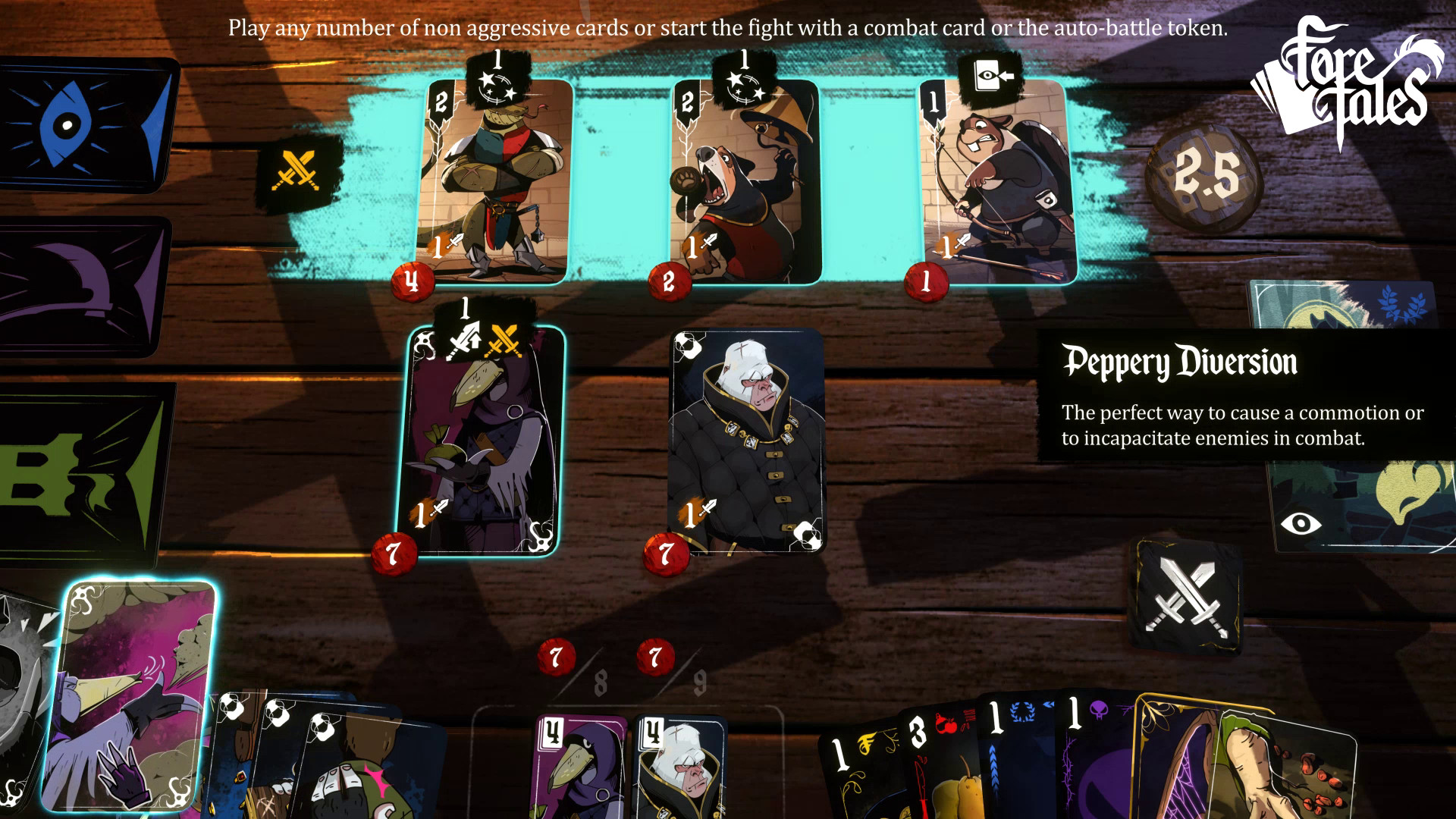
A Fragmented Prediction
There are some other wrinkles to Foretales worth mentioning. Firstly, you acquire various party members throughout your journey, each with their own unique deck of cards. You can only take 3 into any given mission, so you’ll be swapping them out for an extra layer of strategy and synergising. Second, you’ll need to balance when to move on from a region to the next (with the uncertainty of what perils you’ll face) with hanging on to gather more resources but expending more cards.
Moreover, should you be too violent an ape or parrot, you’ll notice your Graveyard pile building rather rapidly. Killing too many foes has knock-on effects in both story dialogue and gameplay, so you might want to watch your kill count, if you know what’s good for you.
While I certainly enjoyed my first 7-hour campaign of Foretales, there were a couple of stumbling blocks that really hindered my enjoyment. For a start, some exploration regions are just tedious to progress. Either they have too many ultra-specific requirements meaning wasting time throwing away cards/locations, or they’re just filler objectives to pad out a level without a meaningful gameplay contribution.
Additionally, there are sections, especially towards the end, which can be brutal to progress past if you’ve not been efficient in earlier regions. The danger of this is you may have to restart an entire level to brute-force your way through the earlier stages so you have more resources for a later one. While I appreciate this is par for the course with the genre, it feels like it punishes taking your time or making “mistakes” too heavily. Having to repeat tens of minutes of content you’ve just done further adds to the sense of repetition too, diminishing the fun.
These elements aren’t game killing by any means, but I found myself feeling put off at times and wanting to either take a break, or just not do another run.
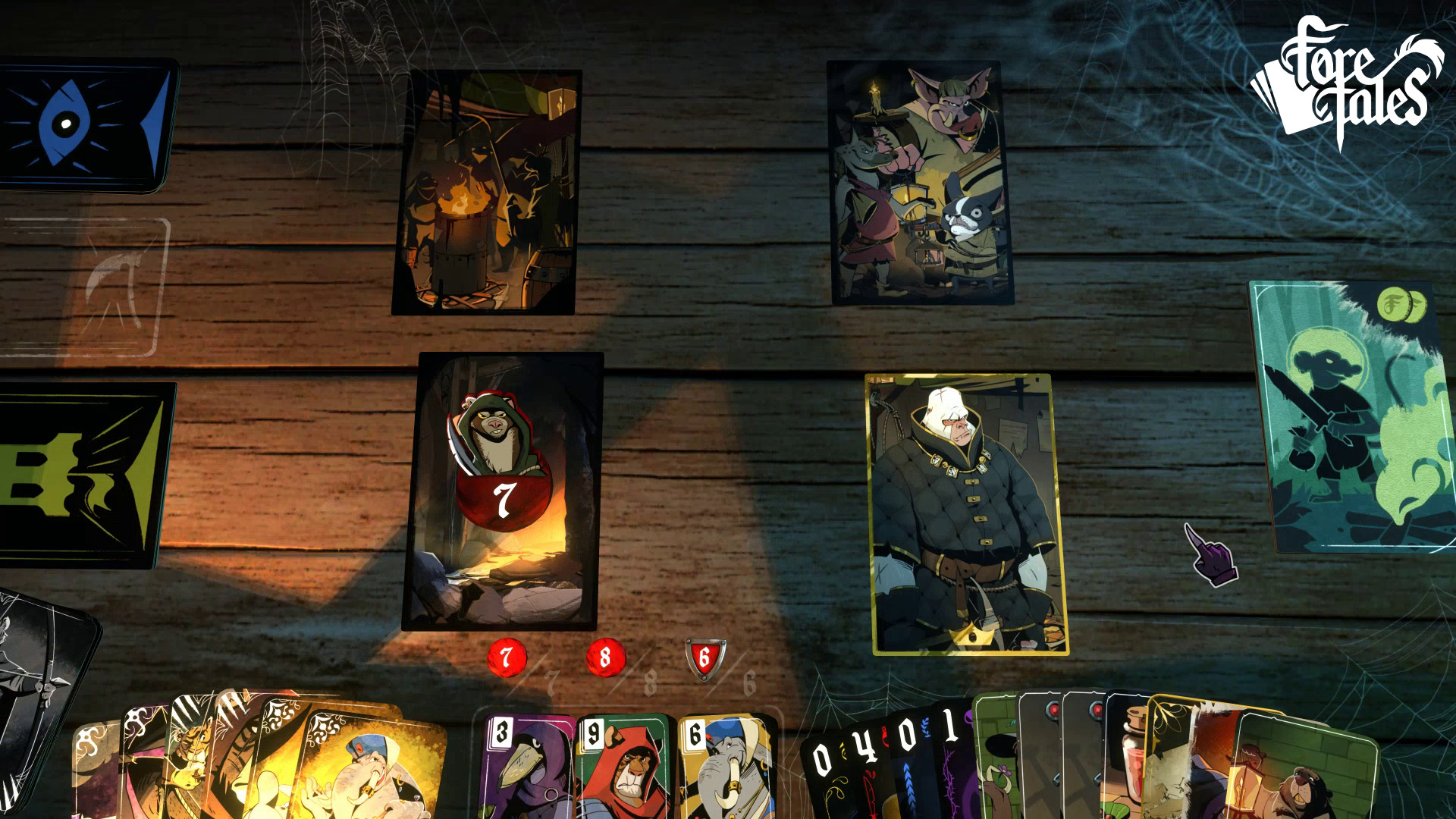
I’ll (Potentially) Be Back
On the presentation front, Foretales has a warm charm to it that’ll be both equally comforting and relaxing. Everything plays out on a board which has small details and elements change depending on the mission and context of what the party are doing. It runs smooth as butter, holding at a lovely 120fps throughout and the animations of cards smacking into each other is satisfying enough. There’s not a lot else to it, given it’s presented as a tabletop experience, but what’s here is nice, albeit you’d expect it to be. Design of the cards and figures has a commendable level of detail and seeing each new one available was cool.
Despite its charms and novel ideas however, parts of Foretales just can’t hold up against the issues of repetition and mundanity. Like an ocean slowly degrading a coastal shore, the withering down happens faster than you’d think. There are some great ideas in here and the combat especially has some real strategic thinking to engross you, but the overall pattern of play can become too autonomous once you get your head around it.
I liked Foretales, but not enough to make me want to play through it numerous times to see the various story paths and outcomes. I had fun with my journey alongside Volepain and Leo, but the narrative doesn’t have enough to entice me to play another 7-8 hours just to see a different ending. If the idea of a tabletop style game and card-based RPG mechanics appeal to you, you’ll have a lot here to appreciate, but there’s a lack of depth to these systems that may have you returning to the old trusted physical versions sooner rather than later.
A card-based choose your own adventure game that emulates your favourite board games, Foretales has a novel gameplay idea that sadly gets a little too repetitive to hold your attention for the multiple playthroughs its story options offer. It’ll make for a warm and comforting couple of sessions play and there’s a lot of scope for an expanded sequel, but what’s here may leave you wanting even after just one playthrough.

Foretales is launching on PC via Steam (review platform) and Nintendo Switch on September 15th, 2022.
Developer: Alkemi Games
Publisher: Dear Villagers
Disclaimer: In order to complete this review, we were provided with a promotional code from the publisher. For our full review policy, please go here.
If you enjoyed this article or any more of our content, please consider our Patreon.
Make sure to follow Finger Guns on our social channels. Twitter, Facebook, Twitch, Spotify or Apple Podcasts – to keep up to date on our news, reviews and features.
